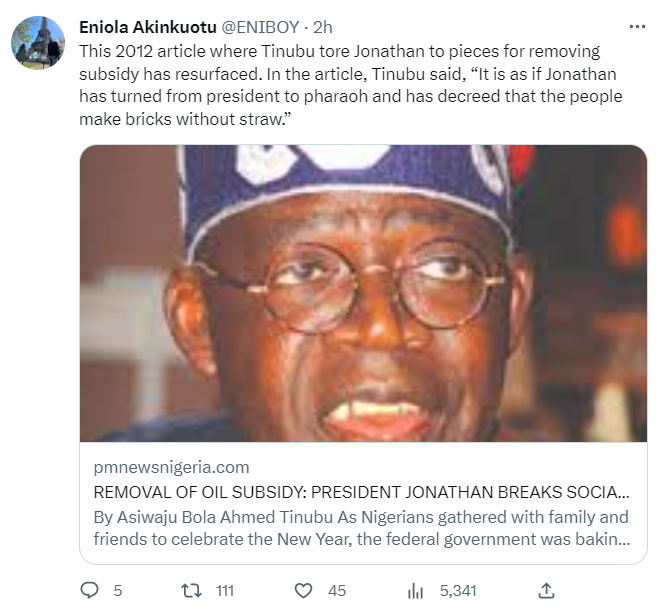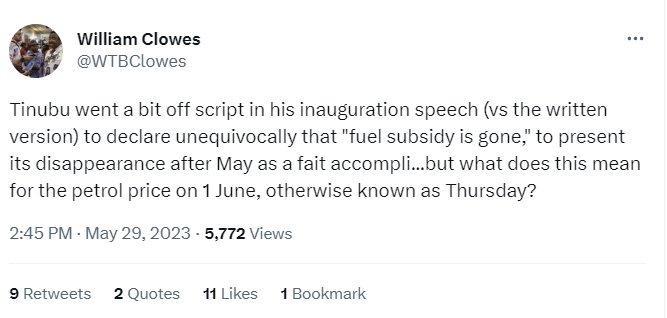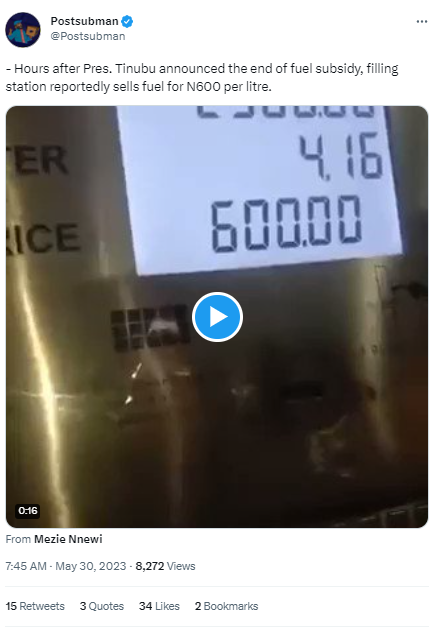On May 24, we reflected on Buhari’s time in office, which we perceived as a period marked by missed opportunities. Here’s an excerpt:
“On May 29, 2023, the president-elect, Bola Ahmed Tinubu, will give his inaugural speech. Despite misgivings about the elections, Tinubu’s speech might give insights into what to expect from his administration. Ultimately, if Buhari’s time in office has taught us anything, we should set our expectations lower.”
Background
In case you missed it, here’s President Tinubu’s inaugural speech summary. Out of his promises to Nigerians, the “fuel subsidy is gone” announcement quickly became a standout topic for Nigerians, and the media contributed to amplifying its implications.
While there was applause from the inaugural attendees and many Nigerians across the country, you only need to go back to eleven years ago, on January 1, 2012, when former President Goodluck Jonathan announced the removal of the fuel subsidy. The nationwide Occupy Nigeria protests followed, leading to Jonathan’s ouster from office.
Tinubu was the same guy who lambasted Jonathan for taking the same decision. At the time, he said, “The government has tossed the people into the depths of the midnight sea” by removing subsidies on fuel.

To be fair to Tinubu, all the leading presidential candidates suggested during their campaigns that the subsidy had to go. Some Nigerians also agree with them. There are at least 7.3 trillion reasons we can think of. Still, we need to understand the shift in stance.
For one, Tinubu went off script. Here’s a part of the written version of the speech shared by his media executives with the press:
“We commend the decision of the outgoing administration in phasing out the petrol subsidy regime, which has increasingly favoured the rich more than the poor. The subsidy can no longer justify its ever-increasing costs in the wake of drying resources. We shall instead re-channel the funds into better investment in public infrastructure, education, health care and jobs that will materially improve the lives of millions.”
Now compare it with what he said by firmly saying that “fuel subsidy is gone.”
We’re not the only ones who noticed this difference:

As it turns out, we wouldn’t have to wait until Thursday.

Citizen spoke to a few Nigerians living in Lagos who shared their thoughts on Tinubu’s impromptu announcement on the subsidy removal. Here’s what they had to say:
Toluwani
“I knew it was going to happen. I don’t feel anything about it. I’m only annoyed and irritated that Nigerians are again trying to exploit the situation because why are filling stations selling at 500-700 already? The subsidy hasn’t been effected yet, so why make life more difficult than it has to be? I’ve said this before, Nigerians are bad people, and if given the opportunity, we’ll do much worse than the leaders we criticise daily. Nonsense.”
Tolulope
“All the three top candidates were clear on this subsidy. Their stand was that it wouldn’t stay. What the president said yesterday in his first speech is a mere formality.
Provisions made down already state subsidy payments will continue until the end of June 2023. So why are filling stations hoarding it? The loudest opposers are those who hoped he wouldn’t be inaugurated, so they need to wake up please and ask the right questions to the right quarters.”
Daniel
“It’s just greed. Yesterday morning, everything was fine. You could walk into a petrol station two days ago, and in three minutes, you’re out. Today, you’ll spend a whole day. These people will not open the filling station till they change the pump price. Fuel price from ₦185 two days ago they’re selling at approximately ₦600 now. With subsidy removal, fuel is supposed to be around ₦380/litre. It’s daylight theft.”
Emmanuel
“I bought fuel yesterday at ₦585 at a filling station in Fola-Agoro, Abule-Ijesha, Lagos. They were the only ones selling at that time, around 8 p.m. They weren’t selling to car owners, only those with kegs. If you came in your car, you’d still have to buy in a keg. And buying with a keg comes with extra charges.
The one that hurt me the most was my way to work this morning. I left home a bit late.
Normally on days like this, I’d ride from my house at Yaba to the office at Ikeja. The price on the ride-hailing app Bolt is usually between ₦1800 and ₦3000. This morning, it was hovering between ₦4200 and ₦5100. On Uber, it was between ₦4500 and ₦4900. Only Lagride had a lower price of between ₦2800 and ₦3000 because I have a discount. On a normal day, it would cost between ₦1500 and ₦1900.
So I think the announcement has caused a lot of panic leading to a price hike.”
It’s only day one, but going by reactions to the announcement both online and offline, Tinubu is up to a rough start in office. Nigerians would be eagerly looking forward to how he responds.




